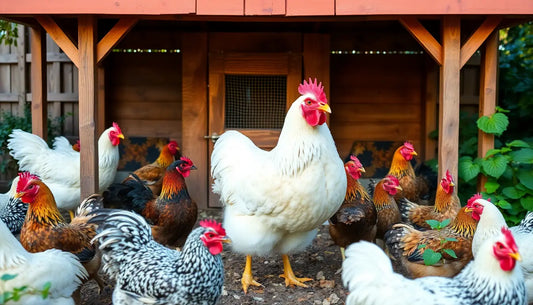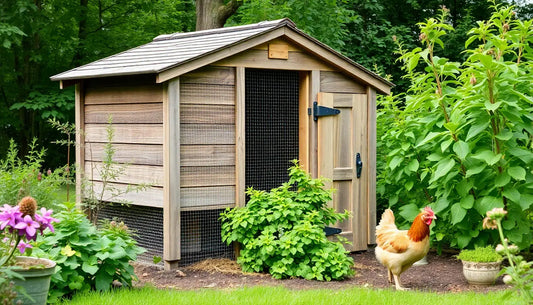
Answers to Common Questions About Choosing Chicken Breeds
Share
Are you thinking about raising chickens in your backyard? You're not alone! Starting a small flock can be a rewarding endeavor, providing you with fresh eggs, natural pest control, and fun new pets. However, one of the first questions you'll encounter is which chicken breeds to choose. Let's dive into some of the most common questions people ask when they're starting their chicken journey, and provide answers to help you make the best decision for your backyard farm.
1. What Are the Best Chicken Breeds for Beginners?
Choosing the right breed is crucial, especially if you're just starting out. Many beginners opt for breeds that are friendly, easy to handle, and good layers. Here are a few beginner-friendly breeds to consider:
- Rhode Island Red: Known for their hardiness and consistent egg production, these birds are great for first-time owners.
- Plymouth Rock: These birds are not only excellent layers but also have a friendly disposition.
- Leghorn: Often recognized for their white feathers and brilliant egg-laying capabilities, Leghorns are superb for egg production.
- Orpington: A gentle breed that is excellent for families with children. They’re cold-hardy and provide a steady flow of eggs.
2. How Many Eggs Can I Expect per Week?
Different breeds produce different numbers of eggs. In general, healthy hens will lay around 4-6 eggs per week. Here’s what you can expect from popular breeds:
- Rhode Island Red: Around 5-6 eggs per week.
- Leghorn: Can produce up to 280 eggs per year or 5+ eggs per week.
- Orpington: Typically around 4-5 eggs per week.
3. Do All Breeds Get Along Well Together?
Most breeds can coexist peacefully if they’re introduced properly and given adequate space. However, it's always important to monitor any new flock for bullying or aggressive behavior. Providing an enriched environment with plenty of hiding spaces and enough room to roam can help alleviate potential conflicts.
If you're setting up your first chicken coop, consider using high-quality materials for safety and convenience. The VEVOR Hardware Cloth, 24'' x 50' Galvanized Wire Mesh Roll is an excellent choice for building a secure chicken coop or run.
4. How Much Space Does Each Chicken Need?
The general rule of thumb is to provide at least 4 square feet of indoor coop space per bird, and a minimum of 8-10 square feet of outdoor space in the run. More space is always better, as it helps reduce the risk of pecking and stress-related issues among the chickens.
5. Are There Any Specific Breeds for Meat versus Eggs?
Yes, certain breeds are optimized for meat production while others are better for laying eggs. For meat, consider breeds like:
- Cornish Cross: This breed is widely known for rapid growth and succulent meat.
- Jersey Giant: Known for its large size, this breed offers a substantial yield.
For egg production, the breeds mentioned previously such as Leghorns, Rhode Island Reds, and Plymouth Rocks are ideal.
6. Can Chickens Be Kept in All Climates?
Generally, there are breeds adapted to various climates. For colder climates, breeds with heavier build and thicker feathers like the Orpington or Australorp are suitable. For warmer areas, lighter breeds such as Leghorns or Andalusians can cope with the heat more efficiently.
7. How Do I Prepare My Backyard for Chickens?
To ensure your chickens have a safe and functional space, consider investing in quality garden infrastructure. The TOPMAX 66" Large Outdoor Farmhouse Wooden Potting Bench Table can serve as an excellent addition to your backyard setup, providing storage and organization for your chicken care tools.
Additionally, secure a proper fence like the VEVOR Garden Fence, 36.6in(H) to keep predators at bay and protect your chickens.
8. What Do Chickens Eat, and How Often?
Chickens have a diverse diet that consists of commercial feed, grains, vegetables, and the occasional treat like mealworms. It's best to feed your chickens twice a day with a formulated poultry feed to ensure they get a balanced diet full of necessary nutrients.
9. How Can I Encourage My Chickens to Lay More Eggs?
Ensure your hens are comfortable and stress-free to promote egg-laying. Provide them with high-quality feed, fresh water, and clean nesting boxes. Consistent lighting, especially during the darker months, can also stimulate laying.
10. How Long Do Chickens Live, and When Do They Stop Laying?
On average, chickens live between 5 to 10 years. However, their peak egg-laying years are usually between 1-3 years. After three years, egg production tends to decrease gradually.
In conclusion, selecting the right chicken breed depends on your personal goals, whether they are focused on egg production, meat, or simply having friendly companions in your garden. Each breed has unique characteristics and space requirements that will necessitate some initial research and investment. We hope these answers serve as a helpful guide.
For more information and resources, don't forget to visit Backyard Raise Grow.

















